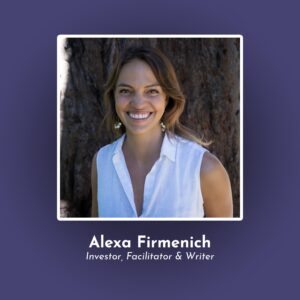
Show Summary
On this episode, Nate is joined by Alexa Firmenich, whose work spans biodiversity advocacy, ESG investing, wilderness excursion facilitating, and podcasting/creative writing. Together, they philosophize on the importance of developing a connection to nature and understanding the – often overlooked – but critical function of biodiversity to the climate and other natural systems. Alexa also delves into her thinking about new economic and cultural models on human systems that could work within the biosphere. How can acknowledging our individual roles as a part of the Earth’s larger system give us a new perspective on what it means to live among its other inhabitants? Why does a system full of external incentives ultimately disincentivize our natural human inclination toward pro-sociality? Will a future of lower energy throughput result in each of us rekindling the inherent connection with the land that we live on, leading to simpler lives – yet perhaps more fulfilling ones?
About Alexa Firmenich
Alexa Firmenich is an investor, consultant and facilitator focused on climate and biodiversity. She is the co-director of SEED, a new center of the Crowther Lab at ETH Zurich. SEED is developing the world’s most holistic measure of biodiversity that reflects multiple scale’s of nature’s complexity for any location on the planet, with the goal to steer financial and political decision-makers to crystallize the value of nature into the global economy. Alexa is also the founder of Ground Effect, an animist investment vehicle that supports early stage nature-based solutions, scientific research and new economic models. Parallel to this work she is trained as a group facilitator in leadership development and ecological pedagogy, designing multi-day learning journeys through her role at Leaders’ Quest. She is also an author, podcast host of Lifeworlds, a founding board member of Terra Habitus, a Mexican environmental fund that operates large-landscape conservation and watershed restoration, and a wilderness guide.
In French, we have a motto that says that a simple drawing is often better than a long explanation. Jean-Marc Jancovici Carbone 4 President
That’s very understandable because with left atmosphere thinking, one of the problems is that you see everything as a series of problems that must have solutions. Iain McGilchrist Neuroscientist and Philosopher
We can’t have hundreds and hundreds of real relationships that are healthy because that requires time and effort and full attention and awareness of being in real relationship and conversation with the other human. Nate Hagens Director of ISEOF
This is the crux of the whole problem. Individual parts of nature are more valuable than the biocomplexity of nature. Thomas Crowther Founder Restor
Show Notes & Links to Learn More
Download transcript00:00 – Alexa Firmenich Works + Info, SEED BioDiversity initiative, Ground Effect, Life Worlds Podcast, Art to Acres
09:02 – 80% of people have nature set as their screen saver
12:31 – Jon Young, 8 shields method of nature connections
13:11 – E.O. Wilson, Biophilia
20:52 – Joanna Macy, The Work that Reconnects
22:19 – Kahlil Gibran Poem
24:13 – Importance of biodiversity
24:50 – 1 out of 2 breaths come from the ocean planktons
25:13 – Plankton harvesting for omega 3s
25:28 – Plankton seed clouds
25:35 – Keystone species
26:53 – Trophic rewilding can expand natural climate solutions
28:56 – Tipping points, Melting ice sheets, Amazon becoming a carbon source
29:27 – Rewilding
29:39 – Derek Gow
30:08 – The diversity of animals identified as keystone species – Shukla – 2023
30:50 – Half-Earth
31:02 – 30 by 30
31:37 – Rich landowners buying up lands and rewilding them
32:41 – Wolf reintroduction into Yellowstone
33:02 – Past conservation and removing native people from their lands
33:32 – Switzerland wolf population cull
34:24 – 6,000 mammal species
39:07 – What Money Can’t Buy: The Moral Limits of Markets | Michael J. Sandel
42:03 – Universal Conservation Income
43:37 – Root of the word finance mean the repayment of a debt
44:16 – Capital Institute, Regenerative finance
46:15 – How Offsets work
49:30 – Carbon Trading Schemes
50:37 – Stream Mitigation Banking
52:15 – New York state outlawing propane stoves
53:29 – The Taskforce on Nature-related Financial Disclosures, Task Force on Climate-Related Financial Disclosures
54:22 – Regenerative Agriculture
54:35 – Food focus at COP 28
58:09 – Rights of Nature
58:20 – Ecocide
1:01:18 – Michael Ableman
1:14:38 – Simone Weil
1:15:46 – Sit Spots
1:17:30 – Sensing Place Life Worlds episode
1:18:01 – Story of Place
1:19:48 – Weed Watching, Urban Ecologies
1:21:19 – Moloch
1:33:48 – Lewis Mumford, Technics and civilization
1:32:12 – Against the Grain, Seeing Like a State, James C. Scott
1:34:26 – Fritjof Capra







